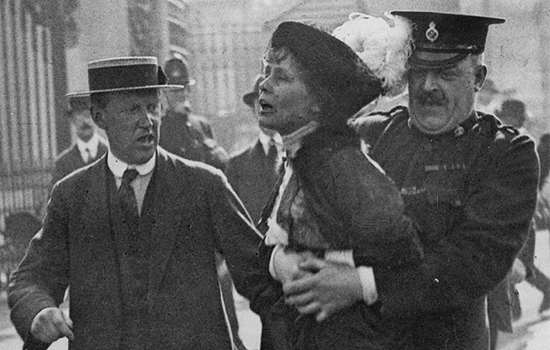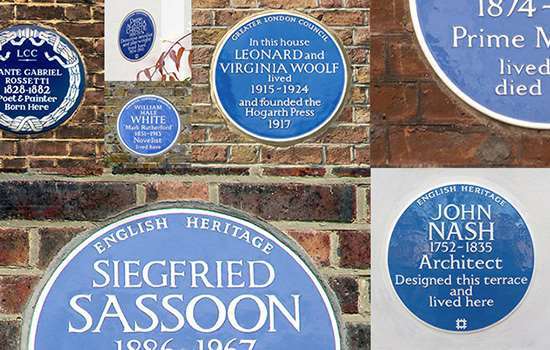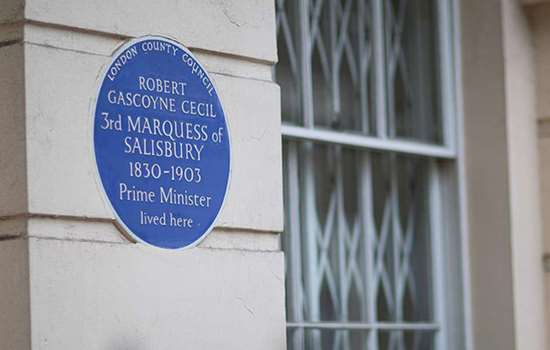KHAN, Sir Syed Ahmed (1817-1898)
Plaque erected in 1997 by English Heritage at 21 Mecklenburgh Square, Bloomsbury, London, WC1N 2AD, London Borough of Camden
All images © English Heritage
Profession
Reformer, Scholar
Category
Education, Philanthropy and Reform, Religion
Inscription
SIR SYED AHMED KHAN 1817-1898 Muslim Reformer and Scholar lived here 1869-1870
Material
Ceramic
Notes
Plaque to R.H. Tawney also at this address
The Muslim reformer and scholar Sir Syed Ahmed Khan (1817–98) is commemorated with a blue plaque at 21 Mecklenburgh Square in Bloomsbury, where he lived in 1869–70.
EARLY CAREER AND THE GREAT REBELLION
For almost 30 years Syed Ahmed (otherwise rendered as Saiyid Ahmad) worked for the British East India Company, which then ruled much of the Indian subcontinent on behalf of the British Empire. He was serving as a magistrate for the company when the Great Rebellion (formerly known as the Indian Mutiny) erupted in 1857. The uprising sought to overthrow British rule in India, but was ultimately unsuccessful.
Syed Ahmed remained loyal to the British and saved thousands of British lives when he evacuated them out of the city of Bijnor, where he was based. It was for this act and his long service to the British that saw him, in 1888, become the first Muslim to be knighted.
However, the rebellion was a personal tragedy for him – many of his relatives and friends were killed in the violence – and the wider cultural and human losses were devastating. In all, tens of thousands lost their lives, and the city of Delhi, where Syed Ahmed was born, was particularly badly affected. Despite his loyalty to the British, Syed Ahmed wrote a damning account of the rebellion – The Causes of the Indian Revolt (1858) – in which he criticised the British for their aggressive expansion into India and their ignorance of Indian culture. He argued for Indian representation in government and for the education of the Indian people, in order to build a bridge between India and their British rulers.
In 1866 he founded the British Indian Association to improve the efficacy of British Indian government, but argued against an Indian National Congress, which would eventually form the roots of the Indian nationalist movement.
21 MECKLENBURGH SQUARE
Syed Ahmed travelled to England in May 1869, and was awarded the Order of the Star of India on 6 August of that year. Travelling with his sons Syed Mahmud and Syed Hamed, and another compatriot, Khudadad Beg, he stayed briefly at the Charing Cross Hotel before taking furnished rooms at 21 Mecklenburgh Square, which then belonged to a Mr and Mrs Ludlam. In all, the Syed party stayed at number 21 for 17 months.
The notion of living as a tenant was unfamiliar to Syed Ahmed, but he found the arrangement ‘extremely comfortable’ and his hosts charming yet unobtrusive. The four members of the party occupied six rooms and were attended by two servants. While here, Syed Ahmed watched the Epsom Derby and witnessed the opening of the Holborn Viaduct. He also responded in print to hostile treatments of the prophet Mohammed and studied the English university system. The appetite for adult education of the British public – especially British women – impressed him greatly.
LATER LIFE
Inspired by the British education system, on his return to India Syed Ahmed founded the Muhammadan Anglo-Oriental College at Aligarh (1877), which continues today as the Aligarh Muslim University. He modelled the college on the residential system of Oxford and Cambridge universities, and the courses included English literature, Oriental languages and European science. Syed Ahmed was active in promoting Urdu as the common language for Indian Muslims, and it was intended that all courses should be taught in Urdu, although English was ultimately adopted.
He also became a pioneer of Islamic modernism. A devout Muslim, he was nonetheless critical of religious orthodoxy and dogma and developed a theology that took account of European science. His approach can be gauged from the title of the periodical he founded in 1870, the Mohammedan Social Reformer.
His blue plaque was unveiled in 1997 by its proposer, Syed Ahmed’s modern biographer, Dr Mohamed Abudulla Pasha.


